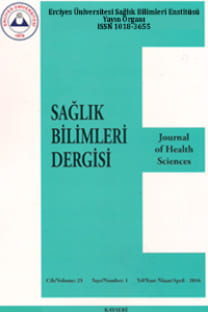BAĞIMLI BAKIM TEORİSİNİN KAVRAM ANALİZİ
Birçok kronik hastalık durumunda hastalar, bakım alıcısı olarak bağımlı hale gelebilmekte, yakınları ise bakım veren rolünü üstlenmektedir. Daha önceleri Orem’in Özbakım Eksikliği Hemşirelik Teorisi kavramlarından olan ve teoriye dönüşen Bağımlı Bakım Teorisi, uygulamayı analiz etmeyi, araştırma çalışmaları için kavramsal bir çerçeve geliştirmeyi ve ilgili hemşirelik bilgilerini düzenlemeyi sağlamada önemli bir teori olarak vurgulanmaktadır. Bu makalede amaç; bağımlı bakım teorisini ve kavramlarını Orem’in Özbakım Eksikliği Hemşirelik Teorisi ile ilişkilendirerek açıklamaktır. Bu çalışmanın, evde ve/veya kurum bakım programlarında bağımlı hale gelen birey ve yakınlarına hizmet götürecek hemşirelere yol göstereceği düşünülmüştür.
Anahtar Kelimeler:
bağımlı bakım, , hemşirelik, bakım veren
THE DEPENDENT CARE THEORY’S CONCEPT ANALYSIS
In case of many chronic diseases, patients become dependent as a care receiver and their significant others take caregiver roles. Dependent Care Theory -which was previously one of the Orem's Self-Care Deficit Theory of Nursing concepts and was turned into a theory- is a significant theory in enabling to analyze the practice, to develop a conceptual frame for studies and to organize the relevant nursing knowledge. This article focused on explaining Dependent Care Theory by associating the Self-Care Deficit Theory of Nursing. We are of the opinion that the current study will guide those nurses who will serve –as a part of hospital and/or home care programs- for dependent individuals and their caregivers.
Keywords:
Caregiver, dependent care, nursing.,
___
- 1. Ekim A, Manav G, Ocakço AF. Ülkemizde Teori Temelli Hemşirelik Araştırmaları: Bir Gözden Geçirme. DEUHYO- ED 2012; 5(4):157-161. 2. Berbiglia VA. Orem’s Self-Care Deficit Nursing Theory in Practice. In: Alligood MR, AM Tomey AM (eds ), Nursing Theory Utilization & Application (2nd ed). Mosby Inc, 2002; pp 239-263.
- 3. Foster PC, Bennett AM. Self-Care Deficit Nursing Theory Dorothea E. Orem. In: George JB (eds), Nursing Theories: The Base for Professional Nursing Practice (5th ed). Pearson Education, 2002; pp 125-149.
- 4. Taylor SG. Self- Care Deficit Theory of Nursing. In: Alligood MR, AM Tomey AM (eds ), Nursing Theorist and Their Work( 6th ed). Mosby Inc, 2006; pp 267-287.
- 5. Hood LJ. Leddy& Peppers’s Conceptual Bases of Professional Nursing (7th ed.). Woters Kluwer, Lippincott Williams& Wilkins, 2010; 140.
- 6. Meleis AI. On needs and self-care, Theoritical Nursing Development& Progress (5th ed). Woters Kluwer Health, Lippincott Williams & Wilkins, 2012; pp 207-227.
- 7. Taylor SG, Renpenning KM. Self-Care Science, Nursing Theory and Evidence-Based Practice. Springer Publishing Company, 2011; pp 107-194.
- 8. Fawcett J. Orem’s Self-Care Framework, Applying Conceptual Models of Nursing: Quality Improvement, Researc, and Practice. Springer Publishing Company, LLC, 2017; pp 189-224.
- 9. Dennis CM. Self-Care Deficit Nursing Theory Concepts and Application. Mosby Inc. 1997.
- 10. Isenberg MA. Application of Dorethea Orem’s Self-Care Defict Nursing Theory. In: Parker ME (eds), Nursing Theories and Nursing Practice ( 2nd ed). FA Davis Company, 2005; pp 149-155.
- 11. Taylor SG, Renpenning KM, Geden EA, Neuman BM, Hart MA. A Theory of Depenent-Care: A Corollary Theory to Orem’s Theory of Self-Care. Nursing Science Quarterly. 2001; 14(1): 39-47.
- ISSN: 1018-3655
- Yayın Aralığı: Yılda 3 Sayı
- Başlangıç: 1993
- Yayıncı: Prof.Dr. Aykut ÖZDARENDELİ
Sayıdaki Diğer Makaleler
DİJİTAL GÜLÜŞ TASARIMI: KULLANILAN SİSTEMLER VE AVANTAJLARI
EVALUATION OF THE USING SOME BIOMATERIALS AS TISSUE CLOSING ADHESIVES AGENT: FIRST RESULTS
Aylin AYDIN SAYILAN, Sacide YILDIZELİ TOPÇU
ÇOCUKLARDA YANIK DURUMUNDA ANNELERİN YAPTIKLARI GELENEKSEL UYGULAMALAR
Meryem EREN, Meryem ŞENTÜRK, Ayhan ATASEVER, Görkem EKEBAŞ, Duygu YAMAN GRAM
SOMATOSTATİN ANALOGLARI İLE GÜNCEL TEDAVİ YAKLAŞIMLARI
Ebru UZUNHİSARCIKLI, Mükerrem Betül YERER
BAZI BİYOMALZEMELERİN DOKU KAPATMA YAPIŞTIRICISI OLARAK KULLANIMININ DEĞERLENDİRİLMESİ: İLK SONUÇLAR
BAĞIMLI BAKIM TEORİSİNİN KAVRAM ANALİZİ
ÇOCUK VE ERGENLERDE D VİTAMİNİ DÜZEYİNİN YAŞ, CİNSİYET, YERLEŞİM YERİ VE MEVSİM İLE İLİŞKİSİ
Sevil OKAN, Fatih OKAN, Osman DEMİR
